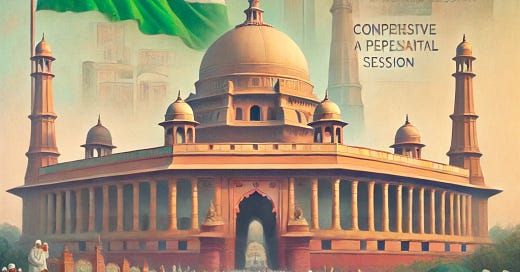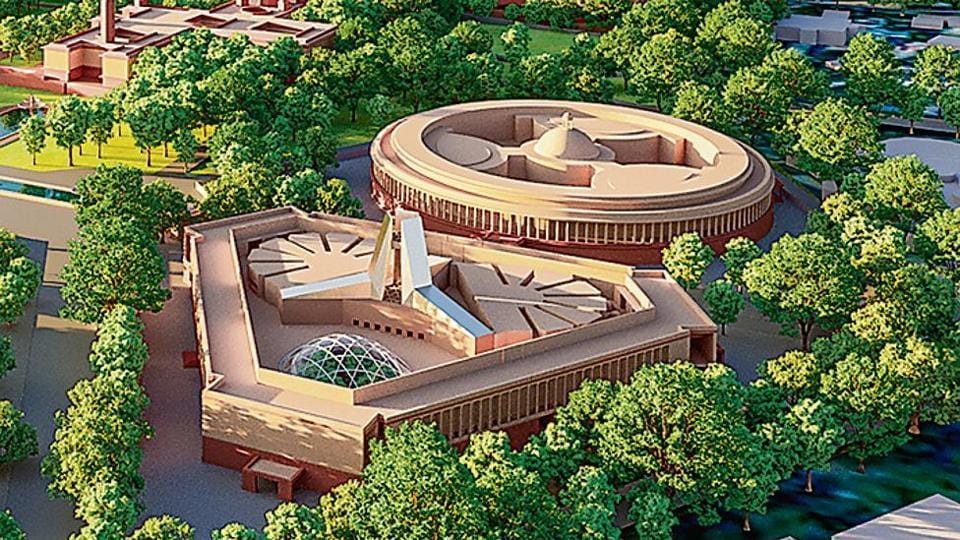Waqf (Amendment) Bill 2024 Introduced in Lok Sabha: Referred to Joint Parliamentary Committee
Waqf (Amendment) Bill 2024 Proposes to Comprehensively Amend the Waqf Act, 1995: Proposed Changes Explained.
Waqf (Amendment) Bill Introduced in Lok Sabha
The Union Minority Affairs Minister, Kiren Rijiju, on Thursday introduced the Waqf (Amendment) Bill, 2024, in the Lok Sabha in the ongoing monsoon session of Parliament, as had been widely anticipated by mainstream media. This Bill proposes approximately 40 amendments to the Waqf Act, 1995, last amended in 2013. The Bill aims to introduce significant changes to rationalise the powers of the Waqf Boards, including their sweeping authority to declare properties as waqf properties through a summary procedure, which has been previously critiqued as draconian. After a brief debate, the Bill was referred to a Joint Parliamentary Committee for further scrutiny, demonstrating the Government’s willingness to seek broader consultation rather than relying solely on its majority in both houses to pass the legislation.
Key Amendments to the Waqf Act
Redefinition of 'Waqf'
Section 3(r) of the Bill redefines "Waqf" as the permanent dedication by any Muslim, practising Islam for at least five years, of any movable or immovable property for purposes recognised by Muslim law as pious, religious, or charitable.
Section 3(r)(iv) expands on Waqf-alal-aulad, ensuring that income from such waqf, when the line of succession fails, is used for education, development, and welfare, including the maintenance of widows, divorced women, and orphans as prescribed by the Central Government.
Introduction of Collector Role
Section 3(da) introduces the position of the Collector, who will assume powers previously vested in the Auqaf Board.
Regulation of Waqf Properties— Detailed Provisions of New Sections 3A, 3B, and 3C
Section 3A: Creation of Waqf and Protection of Inheritance Rights
Section 3A establishes specific conditions for the lawful creation of a waqf. It mandates that no person can create a waqf unless they are the lawful owner of the property and possess the competence to transfer or dedicate such property. Additionally, the creation of a waqf-alal-aulad, which is a waqf for the family of the donor, must not result in the denial of inheritance rights to the heirs, including women heirs, of the waqif (the person making the dedication). This provision ensures that the rights of all heirs are protected and that the creation of waqf-alal-aulad does not circumvent inheritance laws, a practice that has been a source of heartache among natural heirs and has led to protracted litigation.
Section 3B: Mandatory Filing of Waqf Details
Section 3B requires that every waqf registered under the Act, prior to the commencement of the Waqf (Amendment) Act, 2024, must file detailed information about the waqf and its properties on a designated portal and database within six months of the commencement of the Act. The required details include the identification and boundaries of waqf properties, their use, and current occupiers. It also includes the name and address of the waqf creator, the mode and date of creation, and, if available, the waqf deed. Additionally, information about the present mutawalli (custodian) and management, gross annual income from waqf properties, annual taxes and expenses, amounts allocated for salaries, religious and charitable purposes, court cases involving the waqf property, and any other details prescribed by the Central Government must be provided.
This comprehensive filing requirement aims to prepare a detailed inventory of waqf properties, preventing new and frivolous claims regarding old waqfs. More importantly, it shall eliminate the possibility of the Waqf Boards, whether through the connivance of their employees or otherwise, from striking out such properties from their registers and collusively and illegally allowing the land mafia to usurp them.
Section 3C: Handling Government Property Identified as Waqf
Section 3C addresses the issue of government properties mistakenly identified or declared as waqf properties. It stipulates that any such government property, whether identified before or after the commencement of the Act, shall not be considered waqf property. In cases of dispute regarding the ownership of such property, the matter is to be referred to the jurisdictional Collector, who will conduct an inquiry and determine whether the property is indeed government property. Until the Collector submits their report, the property in question will not be treated as waqf property. If the Collector determines the property is government-owned, necessary corrections will be made in the revenue records, and a report will be submitted to the State Government, which will then instruct the Waqf Board to make the appropriate corrections in their records. This section aims to prevent the wrongful appropriation of government property as waqf, ensuring proper classification and record-keeping.
Evacuee Property Wrongly Declared as Waqf Property
In states like Punjab, Haryana, and even Uttar Pradesh, properties vested in the Central Government under the Administration of Evacuee Property Act, 1950, and the Displaced Persons (Compensation and Rehabilitation) Act, 1954, were often misclassified as waqf property. These properties, initially intended for allotment to displaced persons, have remained entangled in administrative errors, because the previous legal framework worked on the principle that “once a waqf property, always a waqf property”. The new provision, though seemingly stringent, will allow the Central Government to retrieve these urban and rural properties and rightfully allot them to displaced persons. Despite having verified claims, these individuals— or their legal hers— have been running from pillar to post for 77 years since Partition. This measure aims to correct past misclassifications, ensuring that those affected by the Partition finally receive the compensation and rehabilitation that was rightfully due to them. This thus a very welcome provision at least from the perspective of Punjab and Haryana.
Changes in Survey and Publication
The Bill replaces the Survey Commissioner with the Collector for conducting waqf surveys (Section 4). It also mandates a 90-day public notice period before updating land records to allow for objections (Section 5). This change aims to make the survey of waqf properties both efficient and effective. Unlike the Survey Commissioner, who, despite being appointed by the State Government, did not have control over land revenue administration, the Collector can now oversee these quasi-judicial functions, addressing a significant shortcoming.
Tribunal Decisions and Dispute Resolution
Under the amended Section 6, disputes over waqf properties are adjudicated by a Tribunal comprising members from the State Judicial Service, State Civil Services, and experts in Muslim law. The amendment extends the period to challenge Tribunal decisions from one to two years and allows late applications for valid reasons. Section 40, allowing the Waqf Board to collect information on potential waqf properties, is omitted. The latter statutory power was grossly abused by the lower functionaries of the Waqf Board to run virtual extortion rackets concerning disputed properties with some semblance of Muslim rights. This was due to the draconian powers under the existing law to declare waqf properties through an ultra-summary procedure, with little scope for statutory appeals.
Constitution of Board and Council
The composition of the Central Waqf Council (Section 9) and Board of Auqaf (Section 14) now includes mandatory representation of women and non-Muslims, aiming for more inclusivity and diversity.
Registration and Audit of Auqaf
Section 36 now requires a waqf deed for registration and mandates the Collector to verify the application’s genuineness. Disputed properties will not be registered without court resolution.
Section 47 revises the audit process, stipulating that auditors must be from a state-prepared panel. The Central Government can also direct audits by the Comptroller and Auditor-General of India and publish audit reports.
Statement of Objects and Reasons
The Bill aims to address inefficiencies in the administration of auqaf, as identified by the Sachar Committee and other reports. It seeks to enhance transparency, accountability, and the equitable distribution of waqf benefits.
Parliamentary Debate
Opposition Concerns
Opposition members raised concerns about federalism, legislative competence, and the infringement of religious freedoms. They argued that including non-Muslim members in the Waqf Council and Board violates the secular principles protected under Articles 25 and 26 of the Indian Constitution.
MP K.C. Venugopal criticised the Bill for attacking the Constitution's secular fabric and infringing on religious freedoms by including non-Muslims in waqf administration. Similar concerns were echoed by MPs Kanimozhi Karunanidhi and E.T. Mohammed Basheer, who also highlighted potential violations of Article 30, which empowers minorities to manage their institutions.
Federalism and Legislative Competence
Opposition members, including MP Supriya Sule, pointed out that land and waqf properties fall under the State List in Schedule VII of the Constitution. They argued that centralising control over waqf administration undermines federal principles. She, however, seems to have missed the point that the 1995 enactment, which is now being amended, is a central law. Moreover, the quasi-judicial authority of the "Collector," introduced for better administration of the Waqfs, is a responsible member of the IAS who works under the supervision and control of the concerned state government.
Government's Defence
Minister Rijiju defended the Bill, citing its alignment with the Sachar Committee's recommendations. He asserted that the Bill does not infringe on religious freedoms and falls within the legislative competence under the Concurrent List’s Entries 10 and 28.
Rijiju referenced the 1976 Waqf Inquiry Report, highlighting issues with current waqf property management, including the concentration of benefits among mutawallis. He justified the amendments as necessary for transparency and efficient dispute resolution, noting the high number of pending cases before Waqf Tribunals.
Summing Up: Ensuring Effective and Inclusive Waqf Administration
The Waqf (Amendment) Bill, 2024, aims to introduce significant changes to the administration of waqf properties, focusing on enhancing transparency and inclusivity. The government argues that these amendments are crucial for effective governance, while the Opposition highlights constitutional concerns, stressing the importance of further scrutiny by the Joint Parliamentary Committee (JPC). This Bill, proposing around 40 amendments, represents a bold initiative by the Central Government to reform the functioning of both Central and State Waqf Boards, which have often been criticized for perpetuating land mafias, especially in urban areas.
A Reformative Measure, Not an Anti-Muslim Instrument
It is important to view this Bill not as an anti-Muslim measure, but as a call for informed debate in both in the JPC and the public domain regarding the proposed provisions. The effective implementation of these amendments, if enacted, is crucial to ensure they do not foster a sense of discrimination against the waqfs or the broader Muslim community. The reformed law should be seen as an opportunity to create an enabling environment for poor and needy Muslim citizens to benefit from waqfs, which are fundamentally charitable institutions.
Consultation and the Way Forward
Furthermore, the JPC is expected to consult a diverse range of stakeholders, providing useful suggestions and fresh perspectives. While the government may or may not accept these recommendations, this process is vital for ensuring that the final legislation is well-informed and balanced. The process has been set into motion. As William Shakespeare rightly remarked: “Action is Eloquence.”






